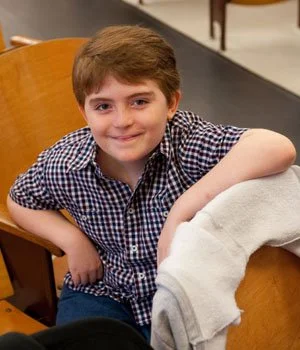
[caption id=“attachment_231” align=“alignright” width=“300” caption=“Zachary Detrick at PS 11 in Manhattan.”][/caption] Zachary Detrick is an eleven-year-old with some really big ideas. His “Fanfare from Symphony No. 7” premiered at Kaufman Center in New York City when he was only four (arranged for trumpet ensemble and chimes by his father). Since then, he taught himself music notation software and began composing prodigiously on the computer. He won the citywide Music Memory Competition in 2009, studies piano with Andrea Hough, and plans to attend the Special Music School, PS 859, in the fall. For two years, Zachary has also participated in Youth Works, our after-school program at Public School 11 in Manhattan. Through this program, he had the opportunity to work with Metropolis composer fellows Ryan Francis, Cristina Spinei, and Ray Lustig. Now Zachary is collaborating with our newest fellow, Brad Balliett, and they’ve become quite the pair:
“Zachary and I have been working together for about two months now, and I’m constantly surprised by his imagination and facility. We discovered that we had a lot in common. For one, a love of Stockhausen, which is so rare that I often find our lessons veering off into conversations about Samstag or Tierkreis. There aren’t many with whom I can discuss these great pieces!
Brad is part of
(or Ensemble ACJW), a unique fellowship program at Carnegie Hall that works in NYC schools and performs around the city. As head of the programming committee, Brad suggested young Zachary’s work as an example of a new generation of composers. As a result, Ensemble ACJW will present a special live performance on April 26 (7pm) at the Upper West Side
(Broadway at West 68th Street), part of the store’s ongoing artistic partnership with Juilliard. The performance will feature the world premiere of Zachary’s "Five Duets for Flute and Bassoon” (with flautist Julietta Curenton and bassoonist Brad Balliett) alongside some stalwarts of the classical world, including Stravinsky, Ligeti, Wolf, and Shoenfeld.
“Five Duets for Flute and Bassoon” gives a nod to Bartok and Stravinsky and tackles some compositional problems posed by Zachary’s teacher,
, with some compelling results. For example, in the first piece, the flute plays only “white key notes” and the bassoon only the “black key notes” leading to a surprising sound. Other contrasts - such as staccato (short) and legato (smooth) playing - and clever solutions - including a scale of Zachary’s own devising - abound in each duet. Here’s a short excerpt from the fourth duet: But it doesn’t stop there. Elementary students at Zachary’s school, PS 11, will be in for a treat on June 8 when Metropolis Ensemble presents the annual end-of-year Youth Works concert that showcases students’ work in collaboration with Brad. One of those pieces will be a new work from Zachary inspired by
Alice in Wonderland
, specifically the Mad Tea-Party scene. Originally, Zachary was working on a full opera of the famous Lewis Carroll story, but he’s put that project on hold to focus on the Metropolis project. Brad and Zachary are meeting regularly to prepare the final piece for the concert: “Each week I visit, he’s added a new and delightfully unique piece of the total picture,” says Brad. “I, for one, can’t wait to hear the final product when we perform it at his school.” As Brad can attest, we are looking forward to more of Zachary’s big ideas: “I’m proud to be among the first to present music by our next emerging American composer!”

